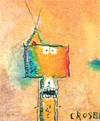 B. Alan Wallace first learned about shamatha meditation in 1972. In “Within You Without You,” Wallace emphasizes the need for this “contemplative technology” in order to fully realize the Buddha’s teachings. The president of the Santa Barbara Institute for Consciousness Studies, Wallace teaches Buddhist theory and practice worldwide and will soon lead a series of eight-week shamatha retreats in Phuket, Thailand. He is the author of many books, including “Mind in the Balance: Meditation in Science, Buddhism, and Christianity.”
B. Alan Wallace first learned about shamatha meditation in 1972. In “Within You Without You,” Wallace emphasizes the need for this “contemplative technology” in order to fully realize the Buddha’s teachings. The president of the Santa Barbara Institute for Consciousness Studies, Wallace teaches Buddhist theory and practice worldwide and will soon lead a series of eight-week shamatha retreats in Phuket, Thailand. He is the author of many books, including “Mind in the Balance: Meditation in Science, Buddhism, and Christianity.”
 Roshi John Tarrant’s essay “In the Wild Places” explores the wilderness of his father’s final days in hospice. Tarrant, who has a Ph.D. in psychology, directs Pacific Zen Institute, in Santa Rosa, California, and works with physicians and executives at Duke Integrative Medicine. He is the author of “Bring Me the Rhinoceros: And Other Zen Koans That Will Save Your Life.” When he’s not writing, he enjoys sailing out of Sausalito.
Roshi John Tarrant’s essay “In the Wild Places” explores the wilderness of his father’s final days in hospice. Tarrant, who has a Ph.D. in psychology, directs Pacific Zen Institute, in Santa Rosa, California, and works with physicians and executives at Duke Integrative Medicine. He is the author of “Bring Me the Rhinoceros: And Other Zen Koans That Will Save Your Life.” When he’s not writing, he enjoys sailing out of Sausalito.
 The poet Chase Twichell was a student of the late John Daido Loori Roshi at Zen Mountain Monastery. Fascinated by the craziness of using words to say the unsayable, she finds her poems getting skinnier and skinnier. Her rules for writing and living are: Tell the truth. No decoration. Remember death. Her next book, “Horses Where the Answers Should Have Been: New & Selected Poems,” is due out from Copper Canyon Press in April 2010. She first met fellow poet Seido Ray Ronci, whom she interviews in “No Words,” in 2008, when, as the editor of Ausable Press, she published his book “The Skeleton of the Crow.”
The poet Chase Twichell was a student of the late John Daido Loori Roshi at Zen Mountain Monastery. Fascinated by the craziness of using words to say the unsayable, she finds her poems getting skinnier and skinnier. Her rules for writing and living are: Tell the truth. No decoration. Remember death. Her next book, “Horses Where the Answers Should Have Been: New & Selected Poems,” is due out from Copper Canyon Press in April 2010. She first met fellow poet Seido Ray Ronci, whom she interviews in “No Words,” in 2008, when, as the editor of Ausable Press, she published his book “The Skeleton of the Crow.”
 Neal Crosbie has been practicing Soto Zen for as long as anyone can remember. His drawings, which follow the spiritual progress and regress of his iconic coyote man, have appeared in Tricycle for the past thirteen years. Crosbie, whose artwork was selected for exhibition this past Spring at the prestigious annual show Salon du Dessin Contemporain in Paris, lives in California, “but,” he says, “there’s nothing wrong with that.”
Neal Crosbie has been practicing Soto Zen for as long as anyone can remember. His drawings, which follow the spiritual progress and regress of his iconic coyote man, have appeared in Tricycle for the past thirteen years. Crosbie, whose artwork was selected for exhibition this past Spring at the prestigious annual show Salon du Dessin Contemporain in Paris, lives in California, “but,” he says, “there’s nothing wrong with that.”
Thank you for subscribing to Tricycle! As a nonprofit, we depend on readers like you to keep Buddhist teachings and practices widely available.